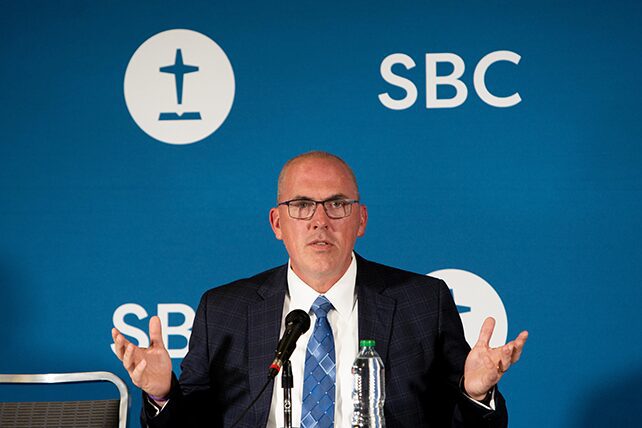It was in the middle of that day that Barber said he received an email from the SBC’s legal team informing him of the amicus brief and recommending the SBC join it.
“It came at 1:30 PM, which was during the EC trustee orientation and a little more than two hours before I needed to lead that other meeting,” Barber remembered, adding, “The filing deadline was that day…so I had a little more than three hours to reply one way or the other.
Barber said that the conversation between him and the SBC lawyers was brief and strictly over email. “And the clock was ticking,” he said. “I became aware that the SBC Executive Committee was joining the brief. I approved our joining the brief. I hadn’t heard anything about it or thought anything about it since then until last Wednesday.”
Barber admitted that “legal work” hasn’t been his “favorite part” of serving as the SBC president and said that he can’t recall his exact thoughts the day he read the brief.
“I did not know the circumstances of the underlying legal case. I do, however, know what has been my consistent practice in addressing these legal matters,” he said, “so I am very confident that I was reading that brief asking myself the question, ‘Is this an honest, true legal question for which the Southern Baptist Convention can take this position in good faith?’”
“What was I thinking?” Barber asked. “I was thinking about THAT question. I did what I did because of the answer to that question.”
Having become familiar with the case behind the SBC’s amicus brief, a case that centers on Samantha Killary, who was sexually abused as a child by her adoptive father, Louisville Police Officer Sean Jackman, Barber said he can’t stop thinking about her.
“What have I communicated to her and to other survivors by taking this action,” he said. “Those questions can give clarity when legal questions are difficult to sort out. And some of the legal questions in play certainly are difficult to sort out.”
RELATED: SBC Sexual Abuse Survivor Tiffany Thigpen: The Four Pastors Have Done Johnny Hunt ‘A Disservice’
“I am not sure exactly what I think about statutes of limitation. I think they are a mixed bag. I may not know for sure what I think about statutes of limitations, but I know for sure what I believe about preventing clergy sexual abuse,” Barber continued. “I know for sure what I believe about reporting suspected sexual abuse every time, right away. I know exactly what I believe about how sexual misconduct disqualifies people from pastoral ministry.”
Barber confessed that he certainly “did not give this decision to file this brief the level of consideration that it deserved.”
“Some of the most important information affecting my decision was information I failed to seek,” Barber continued. “Knowing what I know now, I know that I should have asked more questions. I should have taken the opportunity to request a meeting between the Interim CEO, myself, and our legal counsel to gather more information.”

